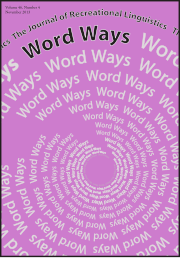| Revision as of 18:01, 19 May 2020 editEgeymi (talk | contribs)Autopatrolled, Extended confirmed users, New page reviewers, Pending changes reviewers, Rollbackers338,369 edits removed Category:Mass media in Indianapolis, Indiana; added Category:Mass media in Indianapolis using HotCat← Previous edit | Revision as of 22:45, 19 May 2020 edit undoSporkBot (talk | contribs)Bots1,245,255 editsm Repair duplicate template argumentsNext edit → | ||
| Line 6: | Line 6: | ||
| | editor = Jeremiah Farrell | | editor = Jeremiah Farrell | ||
| | publisher = {{ubl|] (1968–1969)|] (1970–2006)|] (2007–)}} | | publisher = {{ubl|] (1968–1969)|] (1970–2006)|] (2007–)}} | ||
| | country = | |||
| | firstdate = 1968 | | firstdate = 1968 | ||
| | frequency = Quarterly | | frequency = Quarterly | ||
Revision as of 22:45, 19 May 2020
 Cover of the November 2013 issue Cover of the November 2013 issue | |
| Editor | Jeremiah Farrell |
|---|---|
| Categories | Recreational linguistics |
| Frequency | Quarterly |
| Publisher |
|
| First issue | 1968 |
| Country | USA |
| Based in | Indianapolis, Indiana |
| Website | digitalcommons |
| ISSN | 0043-7980 |
| OCLC | 1604435 |
Word Ways: The Journal of Recreational Linguistics is a quarterly magazine on recreational linguistics, logology and word play. It was established by Dmitri Borgmann in 1968 at the behest of Martin Gardner. Howard Bergerson took over as editor-in-chief for 1969, but stepped down when Greenwood Periodicals dropped the publication. A. Ross Eckler Jr., a statistician at Bell Labs, became editor until 2006, when he was succeeded by Jeremiah Farrell (Butler University).
Word Ways was the first periodical devoted exclusively to word play, and has become the foremost publication in that field. Lying "on the midpoint of a spectrum from popular magazine to scholarly journal", it publishes articles on various linguistic oddities and creative use of language. This includes research into and demonstrations of anagrams, pangrams, lipograms, tautonyms, univocalics, word ladders, palindromes and unusually long words, as well as book reviews, literature surveys, investigations into questionable logological claims, puzzles and quizzes, mnemonics and a small measure of linguistically oriented fiction.
Willard R. Espy discovered Word Ways in 1972, and eventually used material from several dozen articles in his Almanac of Words at Play anthologies. The first of these included complete subscription details for Word Ways, which generated so many inquiries that for decades the publishers were reluctant to change their address.
Current editorial board
- Editor: Jeremiah Farrell, Butler University
- Lacey Echols, Butler University
- Kirstin L. Ellsworth, South Pasadena, California
- Barbara Howes, Butler University
- Katie Mohr, Wiley Publishing Company
- David D. Wright, Hangzhou, China
- Electronic Journal Publishing Assistant: Laina Ridenour, Butler University
See also
- Dave Morice, former editor
References
- ^ Eckler, A. Ross (2010). "Look back!". Word Ways: The Journal of Recreational Linguistics. 43 (3): 167–168.
- Eckler, A. Ross (2010). "Word Ways: Making the alphabet dance (part one)". Word Ways: The Journal of Recreational Linguistics. 46 (3): 219–240.
- ^ Evans, Rod L. (2012). Tyrannosaurus Lex: The Marvelous Book of Palindromes, Anagrams, and Other Delightful and Outrageous Wordplay. London: Penguin Books. ISBN 978-1-101-58863-5.
- ^ Johnson, Dale D.; von Hoff Johnson, Bonnie; Schlichting, Kathleen (2004). "Logology: Word and language play". In Baumann, James F.; Kame'enui, Edward J. (eds.). Vocabulary Instruction: Research to Practice. Guildford Press. p. 180. ISBN 978-1-57230-933-3.
- ^ Winkel, Brian J. (1977). "Word Ways, a journal worth going your way". Cryptologia. 1 (3): 232–234. doi:10.1080/0161-117791832968.
- Campbell, T. (2013). On Crosswords: Thoughts, Studies, Facts and Snark About a 100-Year-Old Pastime. Koehler Books. p. 117. ISBN 978-1938467462.
- Gardner, Martin; Jennings, Ken (2010). Colossal Book of Wordplay. Puzzlewright. ISBN 978-1402765032.
- Zuckermann, Ghil'ad (1998). "Lear's In Israel?". Word Ways: The Journal of Recreational Linguistics. 31 (2): 154–155.
- ^ Espy, Willard R. (1999). The Best of an Almanac of Words at Play. Merriam-Webster. ISBN 978-0-87779-145-4.
- Gardner, Martin (1995). New Mathematical Diversions. Mathematical Association of America. p. 248.
- Lederer, Richard (1998). The Word Circus. Merriam-Webster. ISBN 978-0877793540.
- Zuckermann, Ghil'ad (2011). "Mnemonics in Second Language Acquisition". Word Ways: The Journal of Recreational Linguistics. 44 (4): 302–309.
- Marc Abrahams (December 17, 2012). "Wordplay proves a fruitful area for research". The Guardian. Retrieved October 22, 2014.
- Espy, Willard R. (1975). An Almanac of Words at Play. Clarkson Potter. ISBN 978-0-517-52463-3.
- Espy, Willard R. (1981). Another Almanac of Words at Play. Clarkson Potter. ISBN 978-0-233-97288-6.
- Espy, Willard R. (1982). A Children's Almanac of Words at Play. Clarkson Potter. ISBN 978-0-340-34852-9.
- Eckler, A. Ross (1999). "Willard R. Espy, 1910–1999". Word Ways: The Journal of Recreational Linguistics. 32 (2): 83–84.